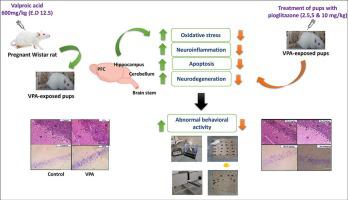当前位置:
X-MOL 学术
›
Pharmacol. Biochem. Behav.
›
论文详情
Our official English website, www.x-mol.net, welcomes your feedback! (Note: you will need to create a separate account there.)
Ameliorating effect of pioglitazone on prenatal valproic acid-induced behavioral and neurobiological abnormalities in autism spectrum disorder in rats
Pharmacology Biochemistry and Behavior ( IF 3.6 ) Pub Date : 2024-02-02 , DOI: 10.1016/j.pbb.2024.173721 Arushi Sandhu , Kajal Rawat , Vipasha Gautam , Alka Bhatia , Sandeep Grover , Lokesh Saini , Lekha Saha
Pharmacology Biochemistry and Behavior ( IF 3.6 ) Pub Date : 2024-02-02 , DOI: 10.1016/j.pbb.2024.173721 Arushi Sandhu , Kajal Rawat , Vipasha Gautam , Alka Bhatia , Sandeep Grover , Lokesh Saini , Lekha Saha

|
Autism spectrum disorder (ASD) is a neurodevelopment disorder that mainly arises due to abnormalities in different brain regions, resulting in behavioral deficits. Besides its diverse phenotypical features, ASD is associated with complex and varied etiology, presenting challenges in understanding its precise neuro-pathophysiology. Pioglitazone was reported to have a fundamental role in neuroprotection in various other neurological disorders. The present study aimed to investigate the therapeutic potential of pioglitazone in the prenatal valproic acid (VPA)-model of ASD in Wistar rats. Pregnant female Wistar rats received VPA on Embryonic day (E.D12.5) to induce autistic-like-behavioral and neurobiological alterations in their offspring. VPA-exposed rats presented core behavioral symptoms of ASD such as deficits in social interaction, poor spatial and learning behavior, increased anxiety, locomotory and repetitive activity, and decreased exploratory activity. Apart from these, VPA exposure also stimulated neurochemical and histopathological neurodegeneration in various brain regions. We administered three different doses of pioglitazone i.e., 2.5, 5, and 10 mg/kg in rats to assess various parameters. Of all the doses, our study highlighted that 10 mg/kg pioglitazone efficiently attenuated the autistic symptoms along with other neurochemical alterations such as oxidative stress, neuroinflammation, and apoptosis. Moreover, pioglitazone significantly attenuated the neurodegeneration by restoring the neuronal loss in the hippocampus and cerebellum. Taken together, our study suggests that pioglitazone exhibits therapeutic potential in alleviating behavioral abnormalities induced by prenatal VPA exposure in rats. However, further research is needed to fully understand and establish pioglitazone's effectiveness in treating ASD.
中文翻译:

吡格列酮对产前丙戊酸诱导的自闭症谱系障碍大鼠行为和神经生物学异常的改善作用
自闭症谱系障碍(ASD)是一种神经发育障碍,主要是由于大脑不同区域的异常而导致行为缺陷。除了其多样化的表型特征外,自闭症谱系障碍还与复杂多样的病因学相关,这对理解其精确的神经病理生理学提出了挑战。据报道,吡格列酮在各种其他神经系统疾病的神经保护中具有重要作用。本研究旨在探讨吡格列酮在 Wistar 大鼠产前丙戊酸(VPA)自闭症谱系障碍模型中的治疗潜力。怀孕的雌性 Wistar 大鼠在胚胎日 (E.D12.5) 接受 VPA,以诱导其后代发生类似自闭症的行为和神经生物学改变。暴露于 VPA 的大鼠表现出 ASD 的核心行为症状,例如社交互动缺陷、空间和学习行为不佳、焦虑增加、运动和重复活动以及探索活动减少。除此之外,VPA 暴露还会刺激不同大脑区域的神经化学和组织病理学神经变性。我们给大鼠施用三种不同剂量的吡格列酮,即2.5、5和10 mg/kg,以评估各种参数。在所有剂量中,我们的研究强调,10 mg/kg 吡格列酮可有效减轻自闭症症状以及其他神经化学变化,如氧化应激、神经炎症和细胞凋亡。此外,吡格列酮通过恢复海马和小脑的神经元损失显着减轻神经变性。综上所述,我们的研究表明,吡格列酮在减轻大鼠产前 VPA 暴露引起的行为异常方面具有治疗潜力。然而,还需要进一步的研究来充分了解和确定吡格列酮治疗自闭症谱系障碍的有效性。
更新日期:2024-02-02
中文翻译:

吡格列酮对产前丙戊酸诱导的自闭症谱系障碍大鼠行为和神经生物学异常的改善作用
自闭症谱系障碍(ASD)是一种神经发育障碍,主要是由于大脑不同区域的异常而导致行为缺陷。除了其多样化的表型特征外,自闭症谱系障碍还与复杂多样的病因学相关,这对理解其精确的神经病理生理学提出了挑战。据报道,吡格列酮在各种其他神经系统疾病的神经保护中具有重要作用。本研究旨在探讨吡格列酮在 Wistar 大鼠产前丙戊酸(VPA)自闭症谱系障碍模型中的治疗潜力。怀孕的雌性 Wistar 大鼠在胚胎日 (E.D12.5) 接受 VPA,以诱导其后代发生类似自闭症的行为和神经生物学改变。暴露于 VPA 的大鼠表现出 ASD 的核心行为症状,例如社交互动缺陷、空间和学习行为不佳、焦虑增加、运动和重复活动以及探索活动减少。除此之外,VPA 暴露还会刺激不同大脑区域的神经化学和组织病理学神经变性。我们给大鼠施用三种不同剂量的吡格列酮,即2.5、5和10 mg/kg,以评估各种参数。在所有剂量中,我们的研究强调,10 mg/kg 吡格列酮可有效减轻自闭症症状以及其他神经化学变化,如氧化应激、神经炎症和细胞凋亡。此外,吡格列酮通过恢复海马和小脑的神经元损失显着减轻神经变性。综上所述,我们的研究表明,吡格列酮在减轻大鼠产前 VPA 暴露引起的行为异常方面具有治疗潜力。然而,还需要进一步的研究来充分了解和确定吡格列酮治疗自闭症谱系障碍的有效性。



























 京公网安备 11010802027423号
京公网安备 11010802027423号